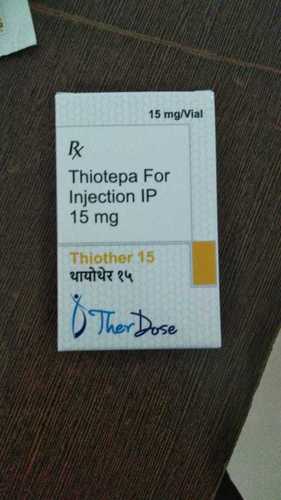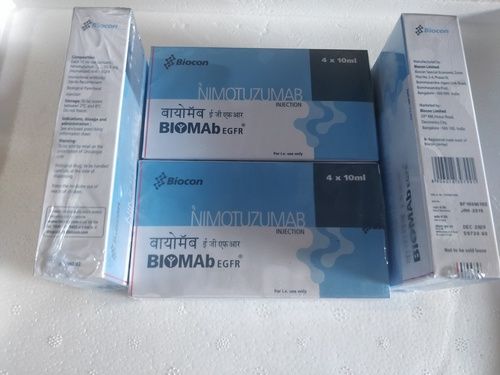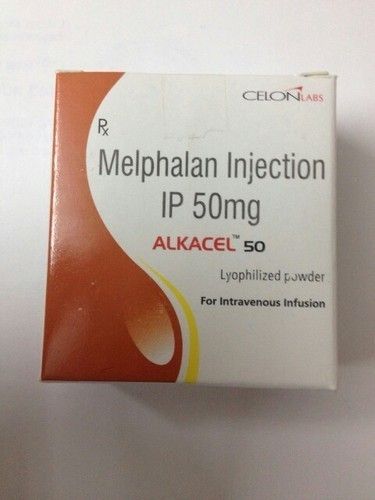
THIOTEPA Injection
Product Details:
THIOTEPA Injection Price And Quantity
- 150-250 USD ($)/Bottle
- 1 Bottle
THIOTEPA Injection Trade Information
- Cash Advance (CA) Telegraphic Transfer (T/T)
- 1000 Bottle Per Month
- 1 Week
- Sample costs shipping and taxes has to be paid by the buyer
- as per pack
- Western Europe North America South America Eastern Europe Middle East Central America Asia Australia Africa
- All India
- as per company
Product Description
Alkylating chemotherapeutic drugs like Thiotepa Injection are used to treat cancer. It functions by altering cancer cells' DNA, preventing their development and replication. Thiotepa is frequently used to treat a variety of malignancies, such as breast, ovarian, and bladder cancer. Healthcare experts deliver it intravenously, and it can be used either alone or in conjunction with other cancer treatments. Thiotepa is frequently saved for situations where other treatments have failed or when high-dose chemotherapy is necessary. In order to achieve the best efficacy and patient safety, the use of Thiotepa requires meticulous monitoring and individualised treatment programmes. This is true of all chemotherapy medications as well.
Characteristics and Advantages of Thiotepa Injection:
1. Effective Alkylating Agent: Thiotepa is a strong chemotherapeutic agent that alkylates DNA, which prevents cancer cells from proliferating and dividing.
2. Thiotepa has a wide range of applications. It is used to treat a number of malignancies, including breast, ovarian, bladder, and several forms of lymphomas.
3. Systemic Therapy: Because Thiotepa is administered intravenously, cancer cells anywhere throughout the body can be treated.
4. Thiotepa may be used in combination with other chemotherapy medications or radiation therapy to improve the effectiveness of the entire treatment plan.
5. Management of Refractory Cases: Thiotepa is frequently used as a therapeutic alternative when cancer has not responded to other treatments.
6. Thiotepa is appropriate for high-dose chemotherapy regimens, especially in the context of getting ready for a stem cell transplant.
7. Thiotepa may occasionally be delivered outside of a hospital setting, which is more convenient for patients.
8. Thiotepa has the potential to be used in palliative care since it can help treat advanced or metastatic cancer patients' symptoms and enhance their quality of life.
9. Experienced Clinical Use: Thiotepa has been used extensively in clinical practise for many years, establishing both its efficacy and safety.
10. Individualised Treatment: Treatment regimens and dosage can be adjusted to each patient's unique cancer type and health status, maximising therapeutic results and lowering side effects.
Thiotepa must be delivered by skilled medical personnel who can carefully evaluate the patient's reaction to therapy and appropriately manage any potential side effects. The advantages of Thiotepa should be carefully balanced against any potential hazards in each patient's situation, just like with any chemotherapy drug.
Thiotepa Injection Applications:
1. Thiotepa is primarily used to treat various cancers, such as breast cancer, ovarian cancer, bladder cancer, and several forms of lymphomas. It is especially helpful in conditions that require high-dose chemotherapy or are resistant to conventional treatments.
2. Thiotepa is a component of conditioning regimens for stem cell transplants used to treat some malignancies, including leukaemia and lymphoma.
3. Palliative Care: Thiotepa may occasionally be administered in advanced or metastatic cancer situations to reduce symptoms and enhance quality of life.
Thiotepa Injection Side Effects:
1. Thiotepa may cause the generation of blood cells in the bone marrow to decline, which raises the risk of anaemia, bleeding, and infections.
2. Vomiting and Nausea: During therapy with Thiotepa, gastrointestinal side effects such nausea and vomiting are frequent.
3. Hair Loss: Thiotepa might result in alopecia, or temporary hair loss.
4. Mucositis: Mouth and gastrointestinal tract mucous membranes may become inflamed and ulcerate, a condition known as mucositis.
5. Skin responses: Patients may develop skin responses at the injection site, such as a rash or redness.
6. Effects on the Liver and Kidney: Thiotepa can have an impact on liver and kidney function, necessitating cautious monitoring during treatment.
7. Thiotepa has been linked to both temporary and permanent infertility in both men and women. Prior to beginning therapy, precautions should be taken to protect fertility.
8. Increased Risk of Subsequent malignancies: Following treatment with Thiotepa, there is a slight chance of acquiring subsequent malignancies, such leukaemia.
9. Rarely, the drug Thiotepa can cause pulmonary toxicity, which can cause respiratory problems.
To manage any potential adverse effects and guarantee the best possible treatment results, it is essential that patients receiving Thiotepa medication are constantly monitored by medical specialists. The choice to utilise Thiotepa should be decided after discussion with the medical staff and consideration of the patient's particular cancer type and overall health.
Other Products in 'Anti Cancer Injection' category
 |
MEHADIA TRADELINKS
All Rights Reserved.(Terms of Use) Developed and Managed by Infocom Network Private Limited. |

 English
English Spanish
Spanish French
French German
German Italian
Italian Chinese (Simplified)
Chinese (Simplified) Japanese
Japanese Korean
Korean Arabic
Arabic Portuguese
Portuguese




 Call Me Free
Call Me Free